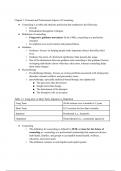Chapter 1: Personal and Professional Aspects of Counseling
● Counseling is a noble and altruistic profession that emphasizes the following:
○ Growth
○ Remediation throughout a lifespan
● Definition of counseling
○ Progressive guidance movement- In the 1900s, counseling as a profession
emerged
○ Its emphasis was on prevention and purposefulness
● Guidance
○ Guidance- focuses on helping people make important choices that affect their
lives.
○ Guidance has more of a historical significance than present-day usage
○ One of the distinctions between guidance and counseling is that guidance focuses
on helping individuals choose what they value most, whereas counseling helps
them make changes
● Psychotherapy
○ Psychotherapy/therapy- focuses on serious problems associated with intrapsychic
disorders, internal conflicts, and personality issues
○ psychotherapy, especially analytical-based therapy, has emphasized
■ The past more than the present
■ Insight more than change
■ The detachment of the therapist
■ The therapist's role as an expert
Table 1.1: Long term vs Short Term; Inpatient vs Outpatient
Long Term 20-40 sessions over 6 months to 2 years
Short Term 8-12 sessions for less than 6 months
Inpatient Residential (i.e., hospitals)
Outpatient Nonresidential (i.e., community agencies)
● Counseling
○ The definition for counseling is defined by 20/20: a vision for the future of
counseling as- counseling as a professional relationship that empowers diverse
individuals, families, and groups to accomplish mental health, wellness,
education, and career goals
○ The definition contains several implicit and explicit points:
, ■ Counseling deals with wellness, personal growth, career, education, and
empowerment concerns
■ Counseling is conducted with persons individually, in groups, and families
■ Counseling is diverse and multicultural
■ Counseling is a dynamic process
○ Counseling specialty- defined by the ACA as an area with counseling that is
narrowly focused, requiring advanced knowledge in the field
○ Specialties include:
■ Educational
■ Marriage
■ Mental health
■ Rehabilitation
■ Aging
■ Assessment
■ Addiction
■ Careers
○ The effectiveness of a counselor depends on several variables
■ Personality and background of the counselor
■ Formal education of the counselor
■ Ability of the counselor to engage in professional counseling-related
activities
● The personality and background of the counselor
○ Counselors should be mature, empathetic, warm, humane in spirit, and not easily
upset or frustrated
● Negative motivators for becoming a counselor:
○ Emotional distress- individuals with unresolved personal trauma
○ Vicarious coping- a person who lives their lives through others
○ Loneliness and isolation- individuals who do not have friends
○ Desire for power- people who feel frightened and impotent in their lives and seek
to control others
○ A need for love- individuals were narcissistic and grandiose and believe that all
problems are resolved through the expression of love and tenderness
○ Vicarious rebellion- persons who have unresolved anger and act out on their
thoughts and feelings through clients
● Personal qualities of an effective counselor
○ The following qualities are a list of functional and positive factors that motivate
individuals to pursue careers and counseling.
■ Curiosity and inquisitiveness
■ Ability to listen
■ Comfort with conversation
, ■ Empathy and understanding
■ Emotional insightfulness
■ Introspection
■ Capacity for self-denial
■ Tolerance of intimacy
■ Comfort with power
■ Ability to laugh
○ Effective counselors grow as persons and help others do the same personally and
globally; in other words, effective counselors are sensitive to themselves and
others. They monitor their own bias, ask for clarification, and explore racial and
cultural differences openly and positively.
○ Effective counselors practice what is called alone time- an intentional practice of
devoting periods in their lives to silence, solitude, and reflectivity.
○ Wounded healer- the ability to work from a perspective of resolved emotional
experience that has sensitized a person to self and others in a helpful way
○ Qualities of effective counselors overtime include
■ Intellectual Competence
■ Energy
■ Flexibility
■ Support
■ Goodwill
■ Self-awareness
● Maintaining effectiveness as a counselor
○ Carl Jung’s idea of synchronicity- two simultaneous events that occur
coincidentally and result in a meaningful connection
○ Compassion fatigue- indifference and apathy to those suffering due to frequent or
over-exposure to people in need; it is characterized as an inability to react
sympathetically or empathetically to a crisis or needs situation.
○ Burnout- has three components: emotional and physical exhaustion, cynicism, and
decreased perceived efficacy.
○ One of the main reasons involved in both is too much work and not enough
downtime, hobbies, distractions, or other activities outside counseling.
○ How counselors can avoid or treat compassion, fatigue, and burnout
■ Associate with healthy individuals
■ Work with committed colleagues and organizations that have a sense of
mission.
■ Be reasonably committed to a theory of counseling
■ Stress reduction exercises
■ Modify environmental stressors
■ Engage in self-assessment
, ■ Periodically examine and clarify counseling roles, expectations, and
beliefs.
■ Obtain personal therapy
■ Set aside free private time
■ Maintain an attitude of detached concern when working with clients
■ Retain an attitude of hope
● Professional aspects of counseling
○ Levels of helping
Category Individuals involved Helping skills
Non-professionals Friends, untrained volunteers Vary greatly, no formal
training
paraprofessional Probation personnel, mental Have basic skills, often work
health techs as part of a team
Professional Counselors, psychologists, Advanced skilled training,
social workers both preventive and remedial
● The education of professional counselors
○ Professional counselors obtain a master's or doctorate and complete internships
and specialty areas.
● Credentialing of counselors
○ Four types of professional credentials, two of which, certification and licensure,
have considerable prestige
Type Activity involved reason
Inspection the process was by a state ascertain whether
agency periodically examines professionals are practicing
the activities of professional the profession in a fashion
practitioners consistent with public safety,
health, and welfare
Registration process by which a weight gain legal
practitioners voluntarily recognition for a profession
submit information to the from a state
state concerning the nature of
their practice




